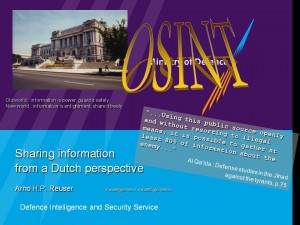
The future of OSINT is M4IS2.
The future of Open Source Intelligence (OSINT) is Multinational, Multifunctional, Multidisciplinary, Multidomain Information-Sharing & Sense-Making (M4IS2).
The following, subject to the approval of Executive and Congressional leadership, are suggested hueristics (rules of thumb):
Rule 1: All Open Source Information (OSIF) goes directly to the high side (multinational top secret) the instant it is received at any level by any civilian or military element responsive to global OSINT grid. This includes all of the contextual agency and mission specific information from the civilian elements previously stove-piped or disgarded, not only within the US, but ultimately within all 90+ participating nations.
Rule 2: In return for Rule 1, the US IC agrees that the Department of State (and within DoD, Civil Affairs) is the proponent outside the wire, and the sharing of all OSIF originating outside the US IC is at the discretion of State/Civil Affairs without secret world caveat or constraint. OSIF collected by US IC elements is NOT included in this warrant.
Continue reading “Search: The Future of OSINT [is M4IS2-Multinational]”






